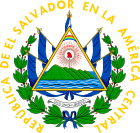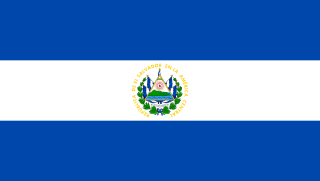
El Salvador, officially the Republic of El Salvador, is a country in Central America. It is bordered on the northeast by Honduras, on the northwest by Guatemala, and on the south by the Pacific Ocean. El Salvador's capital and largest city is San Salvador. The country's population in 2023 was estimated to be 6.5 million.

The economy of El Salvador has experienced relatively low rates of GDP growth, in comparison to other developing countries. Rates have not risen above the low single digits in nearly two decades – part of a broader environment of macroeconomic instability which the integration of the United States dollar has done little to improve. One problem that the Salvadoran economy faces is the inequality in the distribution of income. In 2011, El Salvador had a Gini Coefficient of .485, which although similar to that of the United States, leaves 37.8% of the population below the poverty line, due to lower aggregate income. The richest 10% of the population receives approximately 15 times the income of the poorest 40%.
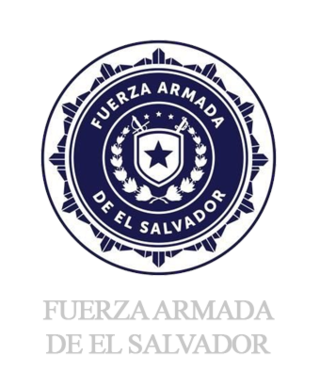
The Armed Forces of El Salvador are the official governmental military forces of El Salvador. The Forces have three branches: the Salvadoran Army, the Salvadoran Air Force and the Navy of El Salvador.

El Salvador is a member of the United Nations and several of its specialized agencies, the Organization of American States (OAS), the Central American Common Market (CACM), the Central American Parliament (PARLACEN), and the Central American Integration System (SICA). It actively participates in the Central American Security Commission (CASC), which seeks to promote regional arms control.
The history of El Salvador begins with several distinct groups of Mesoamerican people, especially the Pipil, the Lenca and the Maya. In the early 16th century, the Spanish Empire conquered the territory, incorporating it into the Viceroyalty of New Spain ruled from Mexico City. In 1821, El Salvador achieved independence from Spain as part of the First Mexican Empire, only to further secede as part of the Federal Republic of Central America two years later. Upon the republic's independence in 1841, El Salvador became a sovereign state until forming a short-lived union with Honduras and Nicaragua called the Greater Republic of Central America, which lasted from 1895 to 1898.

Francisco Guillermo Flores Pérez was a Salvadoran politician who served as President of El Salvador from 1 June 1999 to 1 June 2004 as a member of the conservative Nationalist Republican Alliance (ARENA). He previously served as a deputy of the Legislative Assembly from 1994 to 1999, having been president of the Assembly from 1997 to 1999.
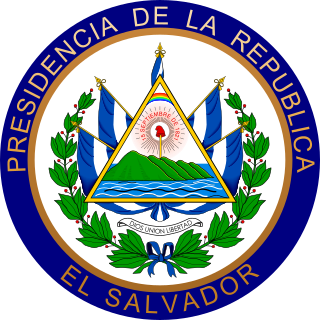
The president of El Salvador, officially titled President of the Republic of El Salvador, is the head of state and head of government of El Salvador. He is also, by constitutional law, the commander-in-chief of the Armed Forces of El Salvador. The office was created in the Constitution of 1841. From 1821 until 1841, the head of state of El Salvador was styled simply as Head of State.

The Nationalist Republican Alliance is a conservative, center-right to right-wing political party of El Salvador. It was founded on 30 September 1981 by retired Salvadoran Army Major Roberto D'Aubuisson. It defines itself as a political institution constituted to defend the democratic, republican, and representative system of government, the social market economy system and nationalism.

The El Salvador national football team, known as La Selecta, represents El Salvador in international football, and is governed by the Salvadoran Football Federation (FESFUT).

Rafael Antonio Gutiérrez was the president of El Salvador from 10 June 1894 to 13 November 1898. He was a leader of the Revolution of the 44 which overthrew President General Carlos Ezeta from April to June 1894. Gutiérrez served as provisional president until being officially inaugurated in March 1895 after his victory in the 1895 presidential election, in which he was the only candidate.

Education in El Salvador is regulated by the country's Ministry of Education. El Salvador consists of the following levels of education:

Club Deportivo Municipal Limeño is a professional Salvadoran football club based in Santa Rosa de Lima, La Unión, El Salvador. Their home stadium is Estadio Jose Ramon Flores, with a capacity of 5,000.

Homenaje a Dos Leyendas is the collective name of a series of annual lucha libre major shows promoted by Mexican professional wrestling promotion Consejo Mundial de Lucha Libre (CMLL). The show started out as Homenaje a Salvador Lutteroth, honoring CMLL founder Salvador Lutteroth, it would later honor Lutteroth and El Santo until 2005 where the event would honor Lutteroth and a different retired or deceased luchador each year. CMLL has held a total of 27 Homenaje events, starting in 1996 and one each year since then. The shows are usually main evented by a Lucha de Apuestas or "Bet match" where competitors wager either their wrestling mask or hair on the outcome of the match.
The Central American Junior and Youth Championships in Athletics is an athletics event organized by the Central American Isthmus Athletic Confederation (CADICA) open for athletes from member associations.
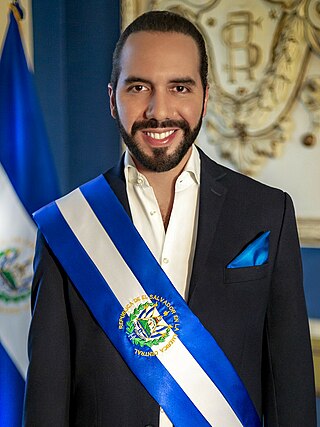
Nayib Armando Bukele Ortez is a Salvadoran politician and businessman who is the 43rd president of El Salvador, serving since 1 June 2019. He is the first Salvadoran president since 1984 who was not elected as a candidate of one of the country's two major political parties: the right-wing Nationalist Republican Alliance (ARENA) and the left-wing Farabundo Martí National Liberation Front (FMLN), of which Bukele was formerly a member.

The Civic Directory was a military junta which governed El Salvador from 2 to 4 December 1931. The junta was composed of twelve members of the Armed Forces from the Army, Air Force, and National Guard. The directory marked the beginning of the era of military dictatorship in El Salvador which lasted until October 1979 with the 1979 coup d'état and the establishment of the Revolutionary Government Junta, a joint civilian-military government which ruled until 1982.
The COVID-19 pandemic in El Salvador was a part of the worldwide pandemic of coronavirus disease 2019 caused by severe acute respiratory syndrome coronavirus 2. The virus was confirmed to have reached El Salvador on 18 March 2020. As of 19 September 2021, El Salvador reported 102,024 cases, 3,114 deaths, and 84,981 recoveries. As of that date El Salvador had arrested a total of 2,424 people for violating quarantine orders, and 1,268,090 people had been tested for the virus. On 31 March 2020, the first COVID-19 death in El Salvador was confirmed.

The Hospital El Salvador is a major hospital in San Salvador, El Salvador, which was planned to be the largest hospital in Latin America. The first phase was constructed between March and June 2020 as a conversion of the International Fair and Convention Center and formed part of El Salvador's response to the COVID-19 pandemic, exclusively receiving COVID-19 patients. Originally intended to be temporary, it was announced in June 2020 that the hospital conversion would be made permanent. In its first phase, the hospital has 400 available beds, a number which was expected to increase to 2,000 total beds upon completion of phase 3 of construction. However, phase 3 was not opened as a hospital and instead served as a vaccination facility. With the decline of the pandemic, the facility has been announced as the home for a new medical school and also houses offices for the Salvadoran health ministry.

China–El Salvador relations are the bilateral relationships between the People's Republic of China and Republic of El Salvador. China maintains an embassy in San Salvador and El Salvador maintains an embassy in Beijing.
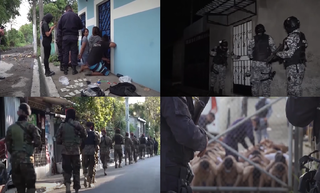
The Salvadoran gang crackdown, referred to in El Salvador as the régimen de excepción and the guerra contra las pandillas, began in March 2022 in response to a crime spike between 25 and 27 March 2022, when 87 people were killed in El Salvador. The Salvadoran government blamed the spike in murders on criminal gangs in the country, resulting in the country's legislature approving a state of emergency that suspended the rights of association and legal counsel, and increased the time spent in detention without charge, among other measures that expanded the powers of law enforcement in the country.

